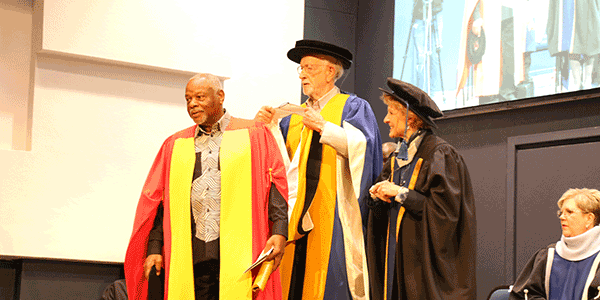Hunters and gatherers in Africa were the original scientists
- Wits University
The wilful lack of knowledge about ‘deep time’ African history must end, says Prof. Molefi Kete Asante, a giant in African studies.

Professor Molefi Kete Asante delivered the keynote address on the occasion of the conferment of his Honorary Doctorate in Literature by Wits University.
The Dean of the Faculty of Humanities, Professor Garth Stevens, delivered Professor Asante's illustrious citation, noting Asante's main role in establishing Afrocentric theory and teaching worldwide. This has enabled generations of African scholars to articulate the continent's history and fundamental contributions to humanity from an Africanist perspective.
"Given his contributions to African-centred scholarship and philosophy, as well as his influence on the development of intellectual thought on Africa and the African Diaspora, it is befitting that the University of the Witwatersrand, Johannesburg, bestow an honorary degree: Doctor of Literature, on Molefi Kete Asante," said Stevens.
US-born Asante began his address to the hall of graduates in a powerful way, reiterating that 300 000 years ago, the first humans were Africans and that racist and colonial oppression of black people eradicates their profound contribution to civilisation's founding achievements.
"Africans were the first to name God. What we know of as science is a result of the thinking of our original ancestors. Indeed who are the original scientists if not hunters and gatherers?" asked Asante.
The beauty and ingenuity of the ancient pyramids, indicates "not only the age of the continent, but that human beings have an enormous capacity for art." The Egyptian pyramids, he said, long preceded Jesus Christ's life on earth. Little, however, is known about Imhotep, one of the Pharoah's architects. "School children know of Homer ( a Greek author) and the Iliad, but they rarely know who Imhotep (an Egyptian polymath) was.”
Asante thus implored the graduates to address the “pestilence of ignorance” and the wilful lack of knowledge about ‘deep time’ African history. “We have rarely interrogated our history and our ancestry. Because for 500 years, Africans have been dislocated…our culture disrupted. (Thus) we need to re-examine everything on our terms.”
Asante outlined three ways graduates can make the world a better place:
- Know that there is one race – the human race. There must not be any artificial rankings.
- The earliest human virtues, including truth, righteousness, justice, harmony, order and reciprocity were African values.
- The maintenance of self and culture is as essential as the creation of those things.
Asante has been recognised as one of the 10 most widely cited African Americans. He is honoured as a HistoryMaker, with an interview archive in the US Library of Congress. The Utne Reader called him one of the "100 Leading Thinkers" in America. In 2001, Transition Magazine reported "Asante may be the most important professor in Black America".
The African Union cited him as one of the 12 top scholars of African descent when he delivered the keynote address at the Conference of Intellectuals of Africa and the Diaspora in Dakar in 2004. That same year, Asande – also a poet, dramatist, and painter – was inducted into the Literary Hall of Fame for Writers of African Descent at the Gwendolyn Brooks Centre at Chicago State University. In 2014, Asante was invited to give a speech at the United Nation's General Assembly on Peace in Africa and to deliver the keynote address at the Japan Black Studies Association's 60th conference in Kyoto, Japan. He holds more than 100 awards for scholarship and teaching.
Vice-Chancellor Professor Vilakazi was particularly impressed with Asante’s assertion that “we are all stardust” (a core African cosmic belief), which links to a key astrophysics concept. “Thank you for showing the interdisciplinarity and universality of African history and civilisation,” said Vilakazi in closing.

